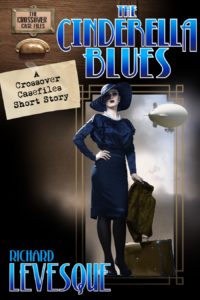Captain Kitty, Where Have You Been?
When I was about 5 years old, my favorite book was Captain Kitty. And by favorite, I mean I had my mother read it to me so many times that 35 years later I was still able to recite the first several pages even though my copy of the book was long gone, probably in some church donation bag from the 1970s. Indeed, the book had such a lasting impression on me that I sought out another copy a few years back, searching for it on eBay so I could share it with my daughter while she was still little enough to appreciate such things.
It’s a simple enough story: Captain Kitty, with his first mate Tabby and crew members Pearly and Mew, set sail “for over a week” and find themselves on a South Sea island “where the warm winds blow and the palm trees grow and the natives wear sweet smiles.” Of course, the natives along with their king and queen are all cats. Tabby admires the queen’s pearls, and so the queen sends her divers into the sea to fetch more. The king takes the crew on a tour of the jungle where “ten little parrots the color of carrots were having a spelling bee.” In the end, there’s a feast, and then Captain Kitty and his crew go home. The final rhyme: “And now at last we’re back again in Catville-By-The-Sea. We’ve been away, but I must say that home looks good to me.”
In retrospect, I think it was the illustrations more than the story itself that captured my imagination. That, and my mother’s enthusiasm for all things feline.
I put this in contrast with an essay I have my students read every semester–Alison Lurie’s “Folktale Liberation” in which the author argues that traditional folktales (Brothers Grimm stuff, for instance) is subversive literature that celebrates the rebellion and strength found in the traditionally disadvantaged–the poor, children, women and girls. Lurie’s point is that since such people were the original audiences for these stories in their oral forms, it only made sense that such characters would be the heroes, and that the villains (giants, ogres, evil kings and queens) would be thinly disguised versions of the real people (landowners, overseers, the nobility) who tormented and troubled the poor folk in their real lives.
Lurie goes on to argue that when children’s stories evolved from the oral tradition and into print, they changed radically. No longer were such stories meant for the children of the poor, but rather for the lettered and moneyed children of the rich–that is, children of the landowners, overseers, and nobility who were the thinly disguised villains of the older subversive stories. This, of course, would not do. So in their place, characters in printed children’s stories made no waves, challenged no authorities, and did not seek to rise above their stations, and those in authority were not so monstrous. Lurie’s criticism is that such stories are boring and do not prepare children for the real world–a world in which monstrous things do happen and where people behave like ogres. Children, she claims, who are not exposed to stories featuring class and gender conflicts are not well prepared for a future in which such conflicts occur.
In my heart, I feel that Lurie is right.
But damn it if Captain Kitty isn’t a perfect example of the kind of story Lurie decries. There is no conflict to be solved, no villain to be defeated or outsmarted. Captain Kitty is a benevolent leader, as are the king and queen. The natives and crew members are all quite happy to remain in their stations in life and do as they’re told with smiles on their feline faces.
So was I ruined by Captain Kitty? I don’t think so. Would I have been better prepared to deal with giants and ogres, bullies and tyrannical bosses if I’d grown up with Harry Potter and Stanley Yelnats and the Beaudelaire orphans instead of Captain Kitty? Maybe. It’s tough to say. It takes more than books to shape a kid’s sense of the world, but they’re bound to be a part of one’s worldview. How much were you shaped by the books you read as a kid?
Alison Lurie Beaudelaire orphans books Captain Kitty Folktale Liberation Harry Potter Percy Jackson Reading







11 Responses
Once upon a time, I believe in our teens or twenties, I recall that you had a strong desire to sign on to work on a ship. I thought a longing for adventure and the romantic ideal of buccaneer stories had got into you. I wonder now if the burning coal of that notion was planted much earlier by this book of seafaring kittens? 🙂 I’ve always been interested in theories about how these stories affect us individually and as a group. Growing up in a multicultural area of LA as we did I enjoyed hearing the fairy tales and fables that children learned from their parents or from their previous culture before they emigrated. Often times the stories, with an emphasis on different morals or values than I had been taught to focus on, seemed to explain something that is commonly perceived or promoted as a dominant aspect of that culture. Perhaps it is the rise of a comfortable middle class that makes more edgy, brutal stories less popular. I suppose we should be thankful for a time of comfort we were provided to ignore the harsh realities of life. In a recent discussion on the topic of “teenagers” ((shiver)) a very political friend claimed that children in societies where there is a great deal of conflict & danger must grow up more quickly and their frontal lobes and other aspects of their brains and personalities do not develop in the same way as children in more comfortable societies who enjoy a more extended childhood. For example: walking around worrying about getting killed VS wondering why the sky is blue. Dealing with bullies in a civilized society is pretty easy and can be taught to most children in about 20 minutes or less. Although I agree there must be a balance between fantasy/reality in development, and a point were we leave the bubble, I propose a counter argument to Lurie: Rather than wish for a harsher fiction to prepare children for harsh reality perhaps we should relish that bubble where they can feel safe to explore any intellectual pursuit they desire and not feel the need to focus on simple survival? I think perhaps you were made a most excellent human organism by your Mom’s love and the adventures of Captain Kitty.
That’s interesting. I have no memory of this ship fantasy. I was probably looking for a decent job and saw ads for cruise ship employment. Scary thought. Thanks for the appraisal of my humanity. I do think that bubble needs to be preserved but only to a point. The world does get ugly pretty quickly, even for the best of us.
I’m unfamiliar with Lurie’s argument, but I balk at the idea of Brothers Grimm-style folktales being better at preparing children for the real world unless we want children to accept the inherent sexism and classism in those versions of the stories. Is she writing about Brothers Grimm or about the folktalkes that preceded them?
She’s mainly focusing on stories that preceded the Grimms but does note that in the first collection of Grimm stories there were far more female characters with magical powers than there were males, and when those males did have power. She also gives the example of “The Sleeping Prince,” a twist on Sleeping Beauty in which a female character has the power to break the prince’s enchantment. Lurie argues that as time went on, those stories dropped out of the canon to be favored by the ones we’re more familiar with, and which Disney had a field day with. I’m not an expert on the Brothers Grimm–just passing on Lurie’s argument.
Interesting. Thanks for clarifying!
I loved Captain Kitty as a young child. I’m in my fifties now…a watercolor artist… currently painting maps…real and imagined. I woke up this morning just knowing I had to paint a map entitled.. The breezes carried them on and on until they came to the tropical isles where the warm winds blow and the palm trees grow and the native wear sweet smiles. Just for reference I live in Minnesota now and we haven’t been above freezing in months!
That’s great. Funny the kinds of things we carry into adulthood. Thanks for stopping by and for commenting.
I just wanted to say that Captain Kitty was my very favorite book as a child. I’m 34 and still have my original copy. I was a very sick child and only my mom reading Captain Kitty could make me feel better when I was in the hospital or taking medication.
Just wanted to say hi to another Captain fan. 🙂
Hi Sarah,
Thanks for getting in touch. It’s always nice to hear from a fellow Captain Kitty fan. My copy disappeared many years ago, probably ending up in a donation bag for our church. I’d like to think of some other little kid getting it at a thrift shop and enjoying it as much as I did. I’m glad I decided to seek out a copy on eBay to share with my daughter. It’s interesting to me that this post on Captain Kitty remains one of my more popular ones.
Take care, and thanks again for reaching out.
I just recently found my childhood copy of Captain Kitty. My son recently married a woman who has a cat named, Kitty Meow Meow and for some reason that made me think of the story that was read to me so many times I could almost recite it from memory some 50 odd years later!
With Captain Kitty on the brain, while cleaning my spare room for my sister to stay in while she was here for the wedding, I found Captain Kitty! I was overjoyed and made my husband listen to me read the entire book as we were cleaning! I was so sad to see the last page had been torn, of course, I knew the words so I was able to finish the book, to my husbands dismay. Damn those kids of mine! I should have known better than to let my little ankle biters near my Jr. Elf books! LOL
Always glad to meet a fellow Captain Kitty fan! Thanks for getting in touch.
Comments are closed.